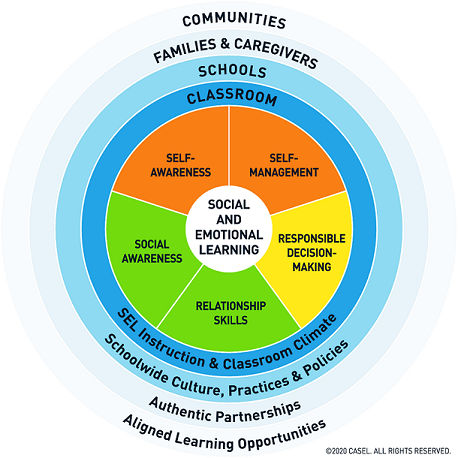California Transformative SEL Competencies
Transformative Social and Emotional Learning (SEL) Competencies describe the knowledge, skills, dispositions, and capacities that children and young people can develop when the conditions are supportive to their healthy, whole development.The Collaborative for Academic, Social, and Emotional Learning (CASEL
![]() ) initially defined Social and Emotional Learning (SEL) more than 25 years ago. CASEL’s SEL framework articulates a systemic approach in which adults intentionally focus on their own social and emotional growth in order to effectively support student skill development across key developmental settings through collaborative planning and improvement processes. CASEL’s interconnected five core SEL competencies
) initially defined Social and Emotional Learning (SEL) more than 25 years ago. CASEL’s SEL framework articulates a systemic approach in which adults intentionally focus on their own social and emotional growth in order to effectively support student skill development across key developmental settings through collaborative planning and improvement processes. CASEL’s interconnected five core SEL competencies
![]() —self-management, self-awareness, social awareness, relationship skills, and responsible decision making—and those key settings are seen in the “CASEL wheel” (Figure 1).
—self-management, self-awareness, social awareness, relationship skills, and responsible decision making—and those key settings are seen in the “CASEL wheel” (Figure 1).
Figure 1. CASEL SEL Framework

Source: ©2020 CASEL. Social and Emotional Learning Framework
![]() . All rights reserved.
. All rights reserved.
In 2020, CASEL updated
![]() the definition of SEL to more centrally locate identity development, educational equity, and adult-student co-creation of learning environments in service of more just communities. In addition to the definition and competencies updates, CASEL, along with academic and practitioner partners, began to formulate an expression of their framework, drawing on scholarship from disciplines such as liberatory education, that describes ways in which SEL can be harnessed to advance social justice: Transformative SEL (T-SEL).
the definition of SEL to more centrally locate identity development, educational equity, and adult-student co-creation of learning environments in service of more just communities. In addition to the definition and competencies updates, CASEL, along with academic and practitioner partners, began to formulate an expression of their framework, drawing on scholarship from disciplines such as liberatory education, that describes ways in which SEL can be harnessed to advance social justice: Transformative SEL (T-SEL).
A 2021 research brief
![]() (PDF) issued by CASEL and the University of Michigan, states:
(PDF) issued by CASEL and the University of Michigan, states:
Transformative SEL was introduced as a way to integrate an explicit equity and social justice lens into the conceptualization and implementation of social and emotional learning (SEL). As Jagers, Rivas-Drake, and Williams (2019)
![]() (PDF) explain, it is a form of SEL aimed at interrupting the reproduction of inequitable educational environments by attending to issues of identity, agency, belonging, and related issues such as power, privilege, prejudice, discrimination, social justice, empowerment, and self-determination.
(PDF) explain, it is a form of SEL aimed at interrupting the reproduction of inequitable educational environments by attending to issues of identity, agency, belonging, and related issues such as power, privilege, prejudice, discrimination, social justice, empowerment, and self-determination.
The California Department of Education (CDE) aims to support and advance the efforts of educators across California who are working to fully integrate systemic SEL and equity by building on the promise of T-SEL as a concept. To provide these supports, the CDE has articulated developmental indicators for CASEL’s five core competencies:
- Self-Awareness (Intrapersonal Focus)
- Self-Management (Intrapersonal Focus)
- Social Awareness (Interpersonal Focus)
- Relationship Skills (Interpersonal Focus)
- Responsible Decision-Making (Inter and Intrapersonal)
The California T-SEL Competencies, developed for voluntary use, complement the California Transformative Social and Emotional Learning Conditions for Thriving. For additional background on the development of California's T-SEL and guidance on their purpose and use, please see the T-SEL Competencies and Conditions for Thriving web page. The T-SEL Readiness and Reflection Prompts can be used to support individual and collective implementation.
The CDE plans to refine these resources as we learn more regarding how they are being used across the state. Please consider sharing feedback regarding your experiences with the California T-SEL Competencies.
